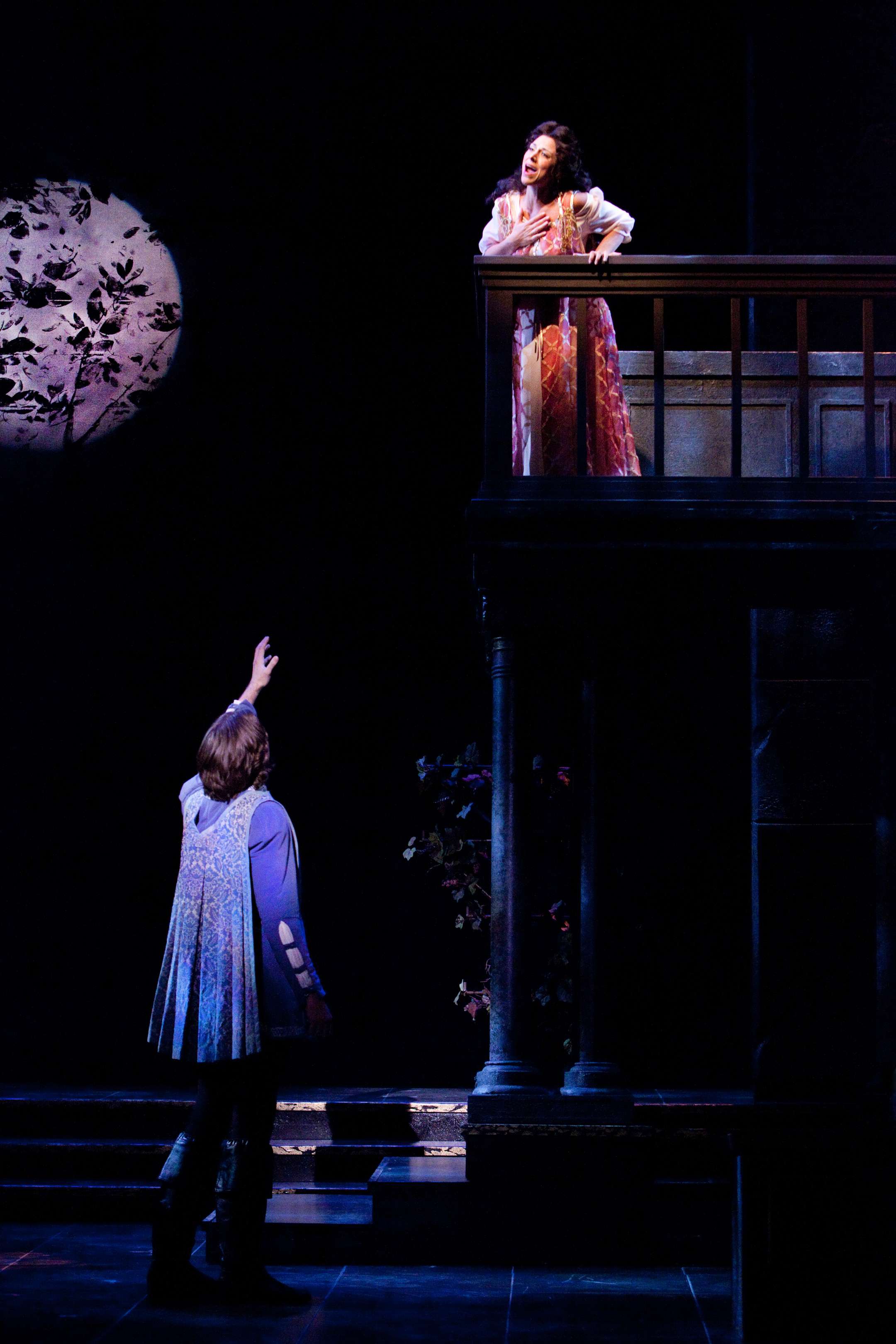|
Back
Roméo and Juliette Fail to Convince Phoenix
Symphony Hall
11/16/2012 - & November 17, 18*, 2012
Charles Gounod: Roméo et Juliette
Brian Stucki (Roméo), Jennifer Black (Juliette), Jamie Offenbach (Capulet), Victor Robertson (Tybalt), David Adam Moore (Mercutio), Jordan Bisch (Frère Laurent/Duke of Verona), Meredith Arwady (Gertrude), Thomas Cannon (Count Paris/Gregorio), Laura Wilde (Stephano), David Margulis (Benvolio)
The Arizona Opera Orchestra and Chorus, Henri Venanzi (Chorus Master), James Meena (Conductor)
Candace Evans (Director), R. Keith Brumley (Scenic Designer), Corinna Rose Bohren (Costume Designer), Douglas Provost (Lighting Designer), Andrea Robertson (Fight Director)

B. Stucki & J. Black (© Harrison Hurwitz/AZO)
After an absence of fifteen years, Gounod’s Roméo et Juliette returns to Arizona Opera in a conservative production. Direction by Candace Evans introduces three unnecessary narrators who come on stage before each act, all dressed in black, to read passages from the original play. So much for creativity. All-purpose scenic design by R. Keith Brumley is impressive and gloomy but not particularly evocative of Renaissance Verona. It could, in fact, befit many XIXth century operas.
But the crippling flaws of this revival lie in the lack of genuine French style, clarity, distinction and grace from the leads (let alone a catastrophic French language and butchered enunciation), and more importantly, the blatant absence of chemistry between Brian Stucki’s Roméo and Jennifer Black’s Juliette. Although Barbier and Carré’s libretto follows the original plot for the most part, the verbal virtuosity of the Shakespearean text is gone. The humor is gone. The comic elements are gone. Gounod’s opera is strictly about the emotions and the pathos spawned by the protagonists’ ill-fated predicament. Failing to give a heart-wrenching and sensual account of the star-crossed lovers causes this opera to fall apart and the performance to drag on. At no point do we fall for the pair in the four duets.
And do the vocal qualities of the protagonists’ redeem the above reservations? Alas, no. Brian Stucki’s timbre is opaque with hardly any sparkle to it. The singing is constricted in the throat and the lack of projection causes his voice to be lost in the ensembles. Admittedly, Jennifer Black has a gorgeous medium register, but the highest notes are loud and strident. Her valse-ariette does not have the required grace and lightheartedness, nor does it do full justice to the lighter writing and trills meant to characterize Juliette’s youth.
What rescues this performance is the quality of the supporting roles and incidentals. Jamie Offenbach, with his deep bass-baritone portrays a respectable Capulet. David Adam Moore is a bold Mercutio, while Meredith Arwalt’s contralto voice is perfect for the part of Gertrude. Laura Wide’s is the expected hotheaded Stephano with a commendable delivery of “Que fais-tu, blanche tourterelle”. Rounding up this otherwise unbalanced cast, Jordan Bisch pins creditable Frère Laurent and Duke of Verona, Victor Ryan Robertson is a noteworthy Tybalt, and so is John Burrit’s Count Paris.
The Arizona Opera chorus, well prepared by Henri Venanzi delivers a powerful, nuanced performance with near-perfect French diction. In the pit, James Meena is, as always, a reliable opera conductor. Whether it be in the gossamer textures or in stormy passages of the score, he draws grace, distinction, and a very authentic Gounod sound from the orchestra.
ConcertoNet is on Facebook
Twitter: @concertonet
Christian Dalzon
|